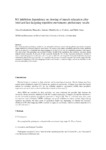M1 inhibition dependency on slowing of muscle relaxation after brief and fast fatiguing repetitive movements: preliminary results

Ver/
Use este enlace para citar
http://hdl.handle.net/2183/21744Coleccións
Metadatos
Mostrar o rexistro completo do ítemTítulo
M1 inhibition dependency on slowing of muscle relaxation after brief and fast fatiguing repetitive movements: preliminary resultsData
2018-10-16Cita bibliográfica
Madinabeitia-Mancebo E, Madrid A, Cudeiro J, et al. M1 inhibition dependency on slowing of muscle relaxation after brief and fast fatiguing repetitive movements: preliminary results. En: Proceedings of the 4th International Conference on NeuroRehabilitation (ICNR 2018): converging clinical and engineering research on neurorehabilitation III; 2018 Oct 16-20; Pisa, Italia. Heidelberg: Springer; 2018. p. 853-857 (Biosystems & Biorobotics; v.21)
Resumo
[Abstract] This work presents preliminary results on the association between central and peripheral expressions of muscle fatigue induced by unresisted repetitive movements. We tested cortico-spinal excitability and intra-cortical inhibition right at the end of 30 s of maximal rate finger tapping (ft) or after 10 s of rest; the contractile properties of the muscle were also tested. This procedure was repeated 12 times. In half of the repetitions, the evaluation was done during induced muscle isquemia. In all cases ft rate decreased during the 30 s of task. Isquemia produced a slowing of muscle contractile properties in all cases, after ft as well as after 10 s of rest post-ft. Intracortical inhibition increased immediately after ft, but recovered after 10 s, regardless the presence of muscle isquemia. Our results suggest that the increment of inhibition in M1 after fatiguing repetitive movements is central in origin, and not an adaptation to the slowed contractility of the muscle.
Versión do editor
Dereitos
The final version is avaliable at Springer Link





